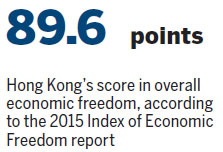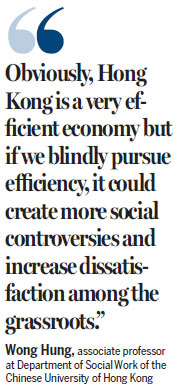Freer economy may split society, warn experts
Updated: 2015-01-31 06:00
By Sophie He in Hong Kong(HK Edition)
|
|||||||
Hong Kong prides itself on being acclaimed as the world's freest economy for the 21st consecutive year, but scholars and economists warn that there's a downside to it, as minimal economic interference from the government would fuel polarization in society.
Wong Hung, associate professor at Department of Social Work of the Chinese University of Hong Kong, told China Daily that a "free" economy means the government interferes very little, and turns the power to the market itself.
But, as a result of globalization and social polarization and if the government does not intervene in certain areas, the gap between the rich and the poor will grow wider, he warned.
Wong pointed out that in many countries regarded as free economies, their central governments do intervene in certain aspects, such as South Korea and Singapore, in their housing policies.
He said Hong Kong's economy is very effective with a relatively fast per capital GDP growth due to a good business environment, but there hasn't been any significant improvement in the people's livelihood in the past few years, while workers' wages have not gone up much. "And, we did not even introduce the first HK$28 per hour minimum wage rule until May 2011," Wong said.

He also said that, at present, there's no rent control in Hong Kong although such a policy was introduced once in the 1970s to bar landlords from raising rents by more than 30 percent in a two-year lease term.
"But, since we scrapped rent control in 1998, it has had a serious effect on the grassroots. From what I know, the rent for a subdivided flat of 110 to 120 square feet was between HK$2,000 and HK$3,000 several years ago, but now, it has doubled," Wong said.
He said there are two ways to evaluate an economy - through efficiency and justice. "Obviously, Hong Kong is a very efficient economy but if we blindly pursue efficiency, it could create more social controversies and increase dissatisfaction among the grassroots. So, I think the government needs to seek a certain balance between efficiency and justice," said Wong.
Raymond Yeung, a senior economist at ANZ Group, told China Daily the core of the market economy is market liberalization and market self-adjustment, which are the essence of the local economy.

But he admitted that market liberalization and market self-adjustment could lead to polarization, with the wealthy getting wealthier and the poor becoming poorer.
Yeung said the government is using its tax revenue as a tool to obtain a certain level of "social balance" without interfering too much with the city's economic efficiency.
The tax revenue usually equals to 20 percent of GDP, and the government uses the money mainly for for public health, public education and other aspects of social welfare, he said.
The government, he added, has been doing these for years. "But, recently, we are hearing more voices of populism, and more people want to see the government raising spending on social welfare. This is understandable. I think it all depends on how free the people would like the economy to be at the expense of social welfare."
Li Pang-kwong, director of the Public Governance Program at Lingnan University, pointed out that the US-based Heritage Foundation is a "right-wing" think tank and, from its political point of view, the less government intervention the better for the economy.
But government intervention in economic activities could be divided into different levels and government should play different roles in different aspects, said Li, adding that it's a very complicated issue that should not be simply seen as "the less the better".
According to the 2015 Index of Economic Freedom report released by the Heritage Foundation, Hong Kong scored 89.6 out of 100 points in overall economic freedom, with slight improvements in business freedom, labor freedom and fiscal freedom components. Singapore came in second, just 0.2 points lower than Hong Kong, followed by New Zealand and Australia.
sophiehe@chinadailyhk.com
(HK Edition 01/31/2015 page8)